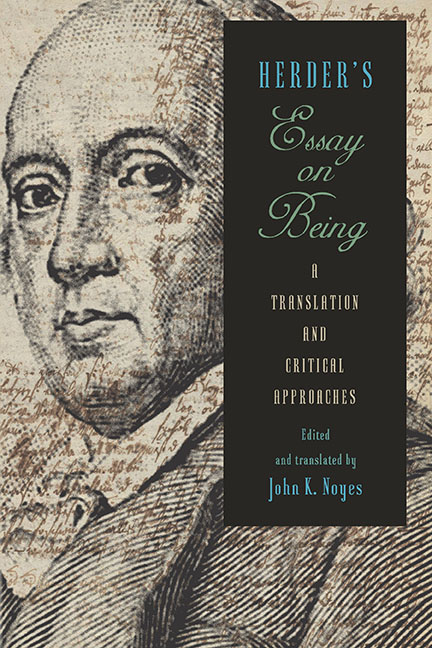Book contents
- Frontmatter
- Contents
- Acknowledgments
- List of Abbreviations
- Introduction: The Essay on Being
- Part I Versuch über das Seyn, by Johann Gottfried Herder
- Part II Critical Essays
- Herder's Essay on Being
- The Order of Being and the Order of Ideas: The Historical Context of Herder's Essay on Being
- Indivisible, Inexplicable, and the Center of All Certainty: Herder's Concept of Being
- The Metaphysical Foundation of Subjective Philosophy in Herder's Essay on Being
- Herder's Kantian Critique of Kant on the Concept of Being
- Attempting to Place the Essay on Being
- Herder's Early Neoplatonism
- Being, Possibility and God: A Comparison of Herder and Heidegger
- Bibliography
- Notes on the Contributors
- Index
The Metaphysical Foundation of Subjective Philosophy in Herder's Essay on Being
from Part II - Critical Essays
Published online by Cambridge University Press: 13 April 2019
- Frontmatter
- Contents
- Acknowledgments
- List of Abbreviations
- Introduction: The Essay on Being
- Part I Versuch über das Seyn, by Johann Gottfried Herder
- Part II Critical Essays
- Herder's Essay on Being
- The Order of Being and the Order of Ideas: The Historical Context of Herder's Essay on Being
- Indivisible, Inexplicable, and the Center of All Certainty: Herder's Concept of Being
- The Metaphysical Foundation of Subjective Philosophy in Herder's Essay on Being
- Herder's Kantian Critique of Kant on the Concept of Being
- Attempting to Place the Essay on Being
- Herder's Early Neoplatonism
- Being, Possibility and God: A Comparison of Herder and Heidegger
- Bibliography
- Notes on the Contributors
- Index
Summary
THE ESSAY ON BEING IS HERDER's first philosophical treatise, a “metaphysical exercitium” (FHA 1:12; EB, 55), written during his studies in Königsberg und dedicated to his revered teacher, Kant. These exercises, whose “premises” (FHA 1:12; EB, 55) he sees in Kant's words, enable the young Herder to engage critically not only with the contemporary metaphysics taught in Kant's lectures (primarily that of Baumgarten and Crusius) but also with the advanced form of this discipline, the rational theology of Kant's Der einzig mögliche Beweisgrund. At the same time, the exercise allows him to conceive of his own approach of “subjective philosophy” (see FHA 1:20; EB, 71). Following the introductory “Dedication,” Herder's first philosophical treatise is divided into three parts: the “Prolegomena” (FHA 1:9–12; EB, 57–61), which provides preliminary epistemological definitions and sketches an outline of his project of a “subjective philosophy,” followed by two chapters. These concern themselves with what is presented as the fundamental concept of subjective philosophy, the concept of Being (Sein): first “On Being as a Concept” (FHA 1:12–16; EB, 61–68) and then “On Being as a Component of a Proposition” (FHA 1:17–20; EB, 68–71). In “Concluding Remarks” (FHA 1:20ff.; EB, 71–73) Herder summarizes the conclusions from the standpoint of his new philosophical program.
Herder takes as his point of departure the empirical theory of knowledge attributed to Aristotle and Locke, with its doctrine of the soul as a blank slate and the derivation of all knowledge from the impressions of the senses (FHA 1:9; EB, 57), and provides a new formulation for the problem of epistemology: “It is perhaps a different question whether our concepts could be anything but sensory, whether there is no other way to the inner sense than through the narrow passages of the external senses” (see FHA 1:10; EB, 58).
To answer this question, whose aim is knowledge of the necessity of a particular genesis of representations, the reference to anthropological facts is not sufficient. Following Hume, Herder declares that the idealistic counterposition to empiricism, which claims that representations of things are caused by the spontaneity of a mental principle and not by objects external to our selves affecting our external senses, cannot be refuted by experience. This is because “propositions of experience” (FHA 1:10; EB, 58) do not permit conclusions about the cause of representations.
- Type
- Chapter
- Information
- Herder's Essay on BeingA Translation and Critical Approaches, pp. 119 - 133Publisher: Boydell & BrewerPrint publication year: 2018



